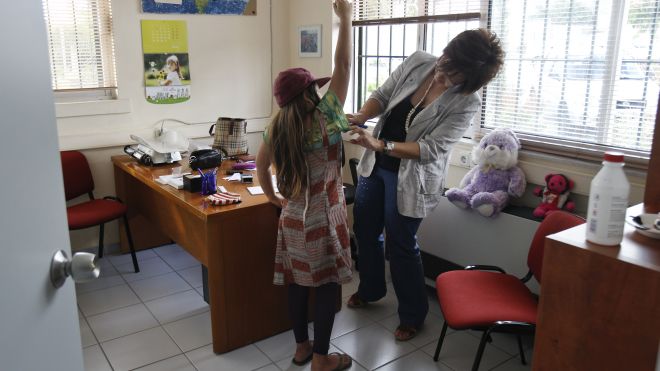Check young kids for motor delays, pediatricians suggest
Doctors should regularly screen babies and young children for delays in motor skill development - including trouble sitting, standing and speaking - at well-child visits, pediatricians said today. In a clinical report, an American Academy of Pediatrics (AAP) panel said diagnosing and treating those problems early on may ultimately improve kids' outlook and help families gain additional support. “Identifying children with delays and motor abnormalities, theoretically or hopefully would set them on a better trajectory,” said Meghann Lloyd, who studies motor development at the University of Ontario Institute of Technology in Oshawa, Canada. Lloyd, who was not involved in the new report, called it “a really big step forward for the field.” Dr. Garey Noritz and colleagues on the AAP's neuromotor screening expert panel lay out the skills that a child should have developed by office visits at ages 9, 18, 30 and 48 months. For example, a 9-month-old baby should be able to roll to both sides, sit well without support and grasp objects. At 18 months, that child should be able to walk, sit and stand on its own. Pediatricians should also ask parents open-ended questions about their child's development and watch the child play for signs of delays or loss of motor skills at well-child visits, the panel said. On a general exam, it recommended that doctors measure head size and look at children's muscle tone, reflexes and eye movements. The U.S. Preventive Services Task Force, a government-backed expert panel, said in 2006 there wasn't enough evidence to recommend for or against screening instruments designed to detect speech and language delays in young kids. The task force does not have screening recommendations for motor delays in general. “The AAP… recognized that we as a profession weren't necessarily doing a good job screening for motor problems,” Noritz, from Nationwide Children's Hospital in Columbus, Ohio, told Reuters Health. Cerebral palsy and muscular dystrophy are two of the most common motor-related diseases and could both be picked up and treated earlier than they typically are now, according to Noritz. He said families often refer to the “diagnostic odyssey” involved in getting a definitive diagnosis for a sick child. “We're hoping that people can get to a specialist more quickly and thus get diagnosed more quickly, but that primary care clinicians at the same time as they're looking for a diagnosis, will refer (kids) to therapy,” he said. Promoting movement There is normal variation in how kids develop, Lloyd said - so if a child is a couple of months late to walk, for example, parents shouldn't be overly concerned. But longer delays, or combinations of multiple motor problems, are a good reason for a visit to the pediatrician, she told Reuters Health. “Other types of movements that don't seem right, like a tremor or a rigidity or some sort of repetitive motor movement would be another red flag for me,” Lloyd added. Typical motor delays that aren't a result of more serious underlying conditions are treated with physical or occupational therapy. Parents can bring their children to an early movement program such as Kindergym to promote development of motor skills, Lloyd said, regardless of other treatments and whether or not they are delayed. Having poor motor skills in general “sets you on a trajectory for low levels of physical activity, which of course is related to obesity,” she said. “The prevention of these delays or the promotion of motor ability can actually impact your health for your lifespan.”source : http://www.foxnews.com/health/2013/05/28/check-young-kids-for-motor-delays-pediatricians-suggest/
